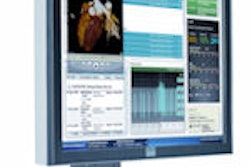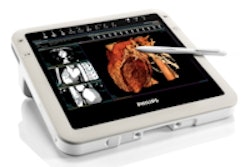
CHICAGO - When radiologists see a picture of a patient along with his or her diagnostic images, reports tend to be longer and include more incidental findings and recommendations.
In a novel study presented Tuesday at the 2008 RSNA conference, doctors from Israel showed that if patient images appear when their digital files are accessed, a more in-depth discussion of the patients' conditions seems to be elicited.
 |
| Dr. Yehonatan Turner from Shaare Zedek Medical Center in Jerusalem. |
In the study, Turner randomly assigned 96 radiologic examinations to one of three groups. In the first group of 32 examinations, the radiologist saw a picture of the patient the first time he saw the chart, and then three months later the radiologist was given the same scan but without the picture. The second group consisted of 38 examinations viewed first without pictures, and then viewed with pictures three months later. A third group of 26 examinations was evaluated without pictures both the first and second time.
The photographs, obtained with patient consent, were taken at the time of the radiologic examination with an off-the-shelf digital camera and embedded into the patients' files. The experiment did not include oncology patients or emergency department patients.
The results were revealing:
The length of the report averaged 55.25 words if a radiologist wrote the report after first opening the file with a picture, versus an average of 49.13 words when analyzing the report without a picture (p = 0.002).
The length of the report averaged 42.42 words if a radiologist wrote the report after first opening the file without a picture, compared with an average of 62.03 words when analyzing the report with a picture (p < 0.001).
Combining the two groups, the length averaged 58.87 words if a radiologist wrote the report after first opening the file with a picture, compared with an average of 45.57 words when analyzing the report without a picture (p < 0.001).
Overall, radiologists noted an average of 4.01 incidental findings -- conditions that were not the main reason for ordering the examination -- if they saw the patient's face first, compared with an average of 2.74 incidental findings if there was no picture (p < 0.001).
Radiologists wrote an average of 10 recommendations for treatment if they saw the patient's face first, versus an average of three recommendations if the chart was read without a picture three months later (p = 0.032).
Radiologists wrote an average of seven recommendations if they saw the patient's face second, compared with an average of one recommendation if the chart was read without a picture first (p = 0.031).
"I recognize that our numbers of patients are small," said Turner, "but despite that, we were still able to achieve statistically significant results. Our study emphasizes approaching the patient as a human being and not as an anonymous case study."
Translating the work into U.S. hospitals could fall victim to HIPAA, cautioned Dr. Katarzyna Macura, associate professor of radiology at Johns Hopkins Medical Institutions in Baltimore.
She said that including the person's face on the study might cause problems in keeping his or her identity confidential if the scans are used in research or for other purposes.
"It is feasible, but it will require additional time, equipment, and staffing," Macura said. "I personally believe that we need this personal interaction, and it may have an impact in a beneficial way."
By Edward Susman
AuntMinnie.com contributing writer
December 3, 2008
Copyright © 2008 AuntMinnie.com



















